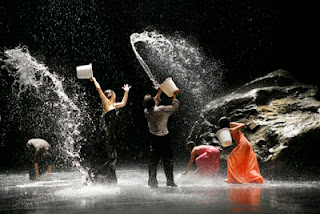 |
Dancing
is simply not my thing. Somehow my dancing genes cannot be bothered
to be woken up, so I am left with zero dancing skills and practically no rhythm
pulsing through my veins. But that does not mean I do not like it. On the contrary, I am strangely fascinated by this activity for various reasons.
In
fact, dancing is often associated with mating rituals, which might
incidentally explain a lack of mates in my younger years. It is
attraction on a rather primordial level, where you do not only catch
the partner's attention but also, if you are good at it, manage to
raise their arousal. Add to that a little bit of booze for
loosening up inhibitions, and you can get the party started.
But
dancing is also a veritable art form. In terms of performance, if
used and taken to the limits of its potential with its raw power and
expression, it communicates more effectively than words ever could.
Although I am a lover of words, of arranging and rearranging
sentences in particular ways for desired effects, I must confess that
the art of dance is a much stronger messenger.
When
it comes to dancing, you are taking the power of music, already an
incredible force on its own, and transposing it into an overall
statement via deliberately chosen gestures. The choreographer, who
might be yourself or another, is using the rhythmic movements of the
body as a pen that engraves its message along with music, which
serves as its paper or celluloid, onto the audience's heart and mind.
I
would like to focus on two creative forces that have for me
revolutionized the art of dancing and taken it to higher levels,
namely the great minds and talents of Bob Fosse and Pina Bausch. Bob
Fosse should have been credited (and patented) with the “Moon
Walk,” as his smooth movements as the snake in The Little Prince
demonstrate. In tune with the music and singing, his dancing
captures and accentuates the character of the snake, the closest any
human may come to its artistic embodiment.
Furthermore,
I was impressed with certain sequences in his semi-autobiographical
movie All that Jazz, especially its very sensual "air-otica" number. Although little is seen in terms of actual nudity,
it insinuates and expresses erotic passion in no indeterminate ways.
I can see how this particular dance number would cause furor among
certain types of audience members because it breaks the boundaries of
what many might call “decency,” without the actual depiction of graphic nudity.
I
had a similar thought when watching the movie Chicago years ago, and
only recently seeing its relation with Bob Fosse as its original
creator / writer as I was impressed how dance manages to give
an erotic quality to people. A person may be sexy and have, for
example, attractive features, but eroticism, as opposed to
pornography on the crude side of the spectrum, is the artful
heightening or switching on of all those features and qualities for
the purposes of arousal. Incidentally, we feel turned on by
the performance.
This
is the case in Bob Fosse's choreography, but to give another more
recent example, consider the lap dance in Tarantino's Grindhouse
segment Death Proof. Unlike the lap dance in Showgirls
(which I have not seen by the
way), in this one, the clothes stay on, and yet eroticism
oozes out of every suggestive move, and the dance skillfully combines
sensuality with aesthetic features.
In
other words, arousal is not only about the stripping of clothes, but
about the rhythmic, well-timed movements that elicit attraction from
others. And this is one thing that Bob Fosse was excellent at, using
movements to express sensuality; they transcend and exceed spoken or
written words and are, in fact, steamier than a scene
depicting intercourse.
Pina
Bausch, however, is in another category all together. I first
stumbled upon her in Almodovar's brilliant Talk to Her. The
few scenes and dance numbers impressed me so much that I felt
compelled to watch Wenders' documentary Pina.
I
was baffled at how expressive dance can become. In her more than
capable hands, dance becomes a modern art form that manages to
express philosophical issues, such as existentialism, isolation and
death, to name a few. This is what makes Pina's work stand out for
me. She transcends the borders of choreography making it not only
entertaining and visually stunning, but also giving it artful
gravitas.
How
does she do it? She uses a number of props, such as water, rocks,
umbrellas. She manages to give each of her dancers / characters an
idiosyncratic expression, such as nervous gestures and obsessive
behaviors. Hence she fleshes out their personality in front of our
eyes, which embeds the characters in a narrative context. It feels as
if we were following a fully engaging and developed story, a
remarkable feat considering that she is using dance and music to do
so.
We
do not need voice-overs, we do not need words or explanations to know
what they are thinking and feeling; it is the wordless rhythmic
movements combined with carefully selected music that sets the mood
and expresses the deep recesses of human sentiment; it is the dance
of life that gives voice to the inexpressible just like dervishes
that spin and turn fervently before the eyes of the divine.






